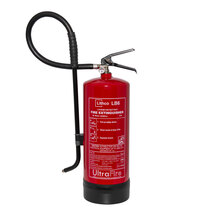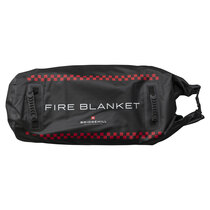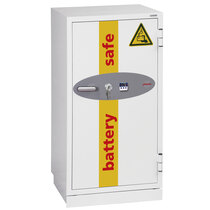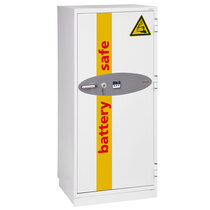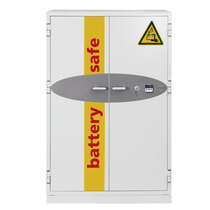-
Contact
Sales & Customer Service
0800 612 6537 support@safelincs.co.uk Live ChatDelivery Enquiries
0800 077 6149 - Resources
Fire & Safety Solutions
CALL OUR TEAM NOW 0800 612 6537
Lines open today 8am - 6pm
FREE Delivery
on marked products
Live Chat - Online
Instant help & Advice
Trade Discounts
and exclusive pricing
0% Credit Available
Open an account now
5 Star Customer Feedback
Lithium-Ion Fire Extinguishers & Containment
Lithium-ion battery fires pose unique challenges due to their intense heat and potential for re-ignition. Our lithium-ion battery fire extinguishers are specifically designed to combat these risks. Unlike conventional fire extinguishers, they utilise a specialised water-based solution with additives to enhance heat absorption and improve effectiveness against lithium battery fires.
Our li-ion fire extinguishers are made by established experts in the world of fire safety.
Whether you're dealing with a battery fire or looking to prevent one, our lithium-ion battery fire extinguishers provide the advanced protection you need. Explore our range to find the best solution for managing this growing fire risk.
Lithco LB6 Lithium-Ion Battery 6ltr Fire Extinguisher - UltraFire
Designed specifically for use on rechargeable lithium-ion battery fires, the LB6 fire extinguisher satisfies modern fire risks in a cost-effective, multi-purpose solution.
- Designed for UPS systems, laptops, power tools, and bulk device chargers
- Heat dispersing, low-viscosity agent to penetrate battery casings
- Rigid applicator lance for enhanced control and user safety
- Third-party tested up to 360Wh battery capacity
P50 Service-Free Lithium-Ion AVD Fire Extinguishers
- Ideal for anywhere lithium-ion batteries are charged or stored.
- Save over 50% on your extinguisher servicing and maintenance costs
- Suitable for use on lithium-ion batteries, Class A fires, and live electrical equipment up to 1000 Volts
- 10-year guarantee and a 20-year lifespan
- CE marked and Kitemarked to BS EN3 by BSI
Write a review
Register your interest to be notified when this product becomes available.
Register InterestLithium Battery Fire Extinguisher - LITH-SAFE
- Designed for use on small home and office lithium powered devices
- Suitable for lithium batteries, Class A fires, and electrical equipment
- Ideal to keep close to where lithium-ion batteries are charged or stored
- Manufactured in accordance with BS 6165:2019
Battery Fire Protection Box - CEMO Li-SAFE
- Transport lithium batteries safely and securely
- Fire and impact resistant
- Stackable and interlocking design
- Carry handles provides easy transportation
- Available in three sizes
Electric Vehicle XL Fire Blanket - Brimstone
Quick to deploy, by the Fire Service, the Brimstone EV XL suppression blanket helps deprive the fire of oxygen, lower the temperature, and contain the amount of highly toxic smoke being released. Providing protection for nearby vehicles and property until it can be safely removed.
- Designed to quickly suppress an electrical vehicle fire and stop it spreading
- Multiple sizes to fit cars of all sizes, small vans, and forklifts
- Ideal for recovery services, charging stations, car parks, ferries, motor dealers, and car repairers
- Comes in a reinforced orange bag, with 'drag & go' pad
Electric Vehicle Standard Fire Blanket - Brimstone
The standard EV suppression blanket from Brimstone assists in the deprivation of oxygen, lowering temperature, and the containment of toxic smoke that is released. Available with extendable poles, to provide additional clearance between the Fire Service and your car.
- Ideal for recovery services, charging stations, car parks, and ferries
- Supplied in a reinforced orange carry bag
- Designed to quickly suppress an electrical vehicle fire
- Available with extendable deployment poles
Car Fire Blanket for Electric Vehicles - Bridgehill
Effective containment of fire and ejected debris from burning electric vehicles.
- Withstands and contains EV fires up to 1,600°C
- Suitable for cars of all sizes up to large SUV
- For locations with multiple cars or near other buildings
- Made using the same materials protecting space vehicles upon re-entry
Basic Storage and Charging Small Cabinet - CEMO LockEX
- Small basic lithium charging cabinet
- Supplied with 6 power sockets
- Equipped with an audible smoke alarm in case of a fire
- Cold smoke seals prevent toxic smoke and flames escaping
- Forklift access clearance (100mm) for positioning and removal of cabinet
Basic Storage and Charging Large Cabinet - CEMO LockEX
- Large basic lithium charging cabinet
- Supplied with 12 power sockets
- Equipped with an audible smoke alarm in case of a fire
- Cold smoke seals prevent toxic smoke and flames escaping
- Forklift access clearance (100mm) for positioning and removal of cabinet
Phoenix Battery Commander 1931 - Lithium-Ion Battery Safe
- 90 minutes fire protection
- Suitable for storing and charging lithium-ion batteries
- Available with key lock, electronic lock or fingerprint lock
- Capacity: 220 litres
- External dimensions (HxWxD): 1245 x 690 x 650mm
- Free delivery to your door
Phoenix Battery Commander 1932 - Lithium-Ion Battery Safe
- 90 minutes fire protection
- Suitable for storing and charging of lithium-ion batteries
- External dimensions (HxWxD): 1770 x 690 x 650mm
- Capacity: 338 litres
- Available with key lock, electronic lock or fingerprint lock
Phoenix Battery Commander 1934 - Lithium-Ion Battery Safe
- 90 minutes fire protection
- Available with key lock, electronic lock or fingerprint lock
- Suitable for storing and charging of lithium-ion batteries
- Capacity: 626 litres
- External dimensions (HxWxD): 1770 x 1125 x 650mm
Premium Storage and Charging Small Cabinet - CEMO LockEX
- Small premium lithium charging cabinet
- Supplied with 6 power sockets
- Equipped with a smoke alarm to link with your fire alarm panel
- Cold smoke seals prevent toxic smoke and flames escaping
- Forklift access clearance (100mm) for positioning and removal of cabinet
Premium Storage and Charging Large Cabinet - CEMO LockEX
- Large premium lithium charging cabinet
- Supplied with 12 power sockets
- Equipped with an integrated smoke alarm to be linked to a fire alarm panel
- Cold smoke seals prevent toxic smoke and flames escaping
- Forklift access clearance for positioning cabinet
Phoenix Battery Fighter 0440 Series - Fire and Security Safe
- 120 minutes fire protection for paper
- Suitable for storing and charging lithium-ion batteries
- Insurance rating: £2,500, £25,000 valuables
- Available with key lock, electronic lock or fingerprint lock
- Capacity: 63 or 84 litres
- External dimensions: 640 x 500 x 500mm or 820 x 520 x 520mm
- Free delivery to your door (7 - 10 working days)
Phoenix Battery Titan 1280 Series - Fire and Security Safe
- 60 minutes fire protection for paper
- Suitable for storing and charging lithium-ion batteries
- Insurance rating: £2,000, £20,000 valuables
- Available with key lock, electronic lock or fingerprint lock
- Capacity: 19, 25 or 36 litres
- External dimensions: 360 x 410 x 365mm / 410 x 450 x 430mm / 515 x 400 x 440mm
- Free delivery to your door (7-10 working days)
Premium Plus Storage and Charging Small Cabinet - CEMO LockEX
- Small premium plus storage and charging cabinet for lithium batteries
- With 6 power sockets to charge multiple devices at once
- Integrated smoke alarm – wired into the buildings fire alarm panel
- Cold smoke seals prevent toxic smoke and flames from escaping
- Forklift access clearance (100mm) for positioning and removal of cabinet
Premium Plus Storage and Charging Large Cabinet - CEMO LockEX
- Large premium plus lithium charging cabinet
- Supplied with 12 power sockets
- Equipped with integrated smoke alarm in case of an incident
- Fitted with cold smoke seals prevent toxic smoke and flames escaping
- Forklift access clearance for positioning and removal
How do you put out a lithium-ion battery fire?
Lithium-ion battery fires require specialised approaches due to their unique challenges. To effectively tackle these fires, use lithium-ion battery fire extinguishers specifically designed for the task. Lithium-ion batteries can reach extremely high temperatures during a fire, often exceeding 1000°C, making them difficult to control and extinguish. Moreover, the risk of re-ignition remains even after the initial flames are extinguished, as battery cells can continue to smoulder and reignite hours or days later.
Lithium-ion battery fire extinguishers are equipped with specialised agents tailored to address the properties of lithium-ion fires. These extinguishers often feature water-based solutions with additives that enhance heat absorption and minimise the risk of re-ignition. The formulation of these agents helps cool the battery rapidly and efficiently, preventing it from reaching temperatures that could lead to further combustion.
To ensure reliability, battery fire extinguishers undergo rigorous testing to meet stringent safety standards. This thorough testing confirms their effectiveness in handling the extreme conditions associated with lithium-ion battery fires.
Lithium battery safety
Ensuring lithium battery safety is vital due to the unique fire risks associated with lithium-ion batteries. These batteries, commonly used in electronic devices, can pose significant hazards if not properly managed. To protect against these risks, having the right equipment is crucial, and lithium-ion battery fire extinguishers are specifically designed to address these challenges.
Our fire extinguishers are thoroughly tested to ensure they meet rigorous safety standards and perform reliably when needed. Investing in these tailored extinguishers enhances your ability to manage lithium battery fires safely and efficiently.
Lithium-Ion Battery Containment Boxes and Cabinets
Lithium-ion containment boxes and cabinets allows for safe storage and transportation of lithium-ion batteries, to protect against fire risks and explosions. Li-ion batteries are becoming increasingly common, therefore it’s essential to prevent potential fire hazards due to the risks of overheating, thermal runaway, and degradation that can lead to fires or explosions. When batteries show signs of failing – such as overheating, swelling, or leaking – containment solutions isolate the battery which ensures a fire or explosion risk is contained. For industries handling large quantities of lithium-ion batteries, these cabinets offer secure storage.




















